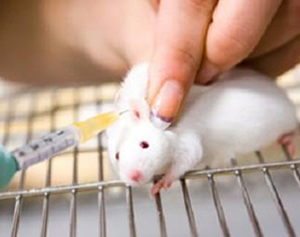Science Foundation Ireland move warmly welcomed
The Irish Anti-Vivisection Society (IAVS) is delighted to announce that the Irish Government is, for the first time, explicitly providing funding for scientific research to replace the harmful use of animals in experimentation and testing.
The historic development follows years of lobbying from the IAVS and a meeting with Science Foundation Ireland’s Director General Professor Mark Ferguson last year.
This research funding opportunity comes as part of the SFI’s ‘Investigators Programme 2016’ call. The Foundation is publicly emphasising that it ‘is providing applicants with the opportunity to seek funding to support the development and validation of new tests, models and approaches not involving the use of live animals and/or addressing the principles of the 3Rs (Replacement, Reduction and Refinement).’ [1]
This move is vital as in recent years Ireland has become one of the heaviest users of animals in harmful experiments in Europe, with approximately 225,000 animals sacrificed in 2014 - 49 animals per 1000 people. [2] What’s more, an unusually large proportion of tests – about 40% - are in the highest category of pain severity (compared with 8% in the UK, for example). This is down to the large proportion of acute toxicity tests, particularly the notorious Lethal Dose 50% tests for botox- type chemicals, even though they are widely regarded as scientifically weak and unnecessarily cruel.
Despite this grave situation, Ministerial Written Answers [3] have confirmed that there had been no dedicated government funding to develop alternatives to animal tests – until now.
The SFI’s announcement means that Ireland is now starting to fulfil its legal requirements under EU law to contribute to the international push to replace animal testing. [4] Not only does this research funding have the potential to spare thousands of animals from pain and distress, but new non- animal methods are expected to mean ‘more effective, faster, cheaper toxicological testing to better predict human risk and meet regulatory needs’, according to European medical research chiefs. [5]
Animal testing is an outdated technology and so there are also potentially huge economic benefits for Ireland from the development and commercialisation of new, human-focussed testing technologies. [6]
Yvonne Smalley, IAVS chairperson, comments:
‘We would like to warmly congratulate Science Foundation Ireland for this historic step forward for both animal protection and human health. We would also like to thank the Health Products Regulatory Authority for their input into this new funding scheme.
The Irish state’s traditional attitude towards animal welfare has been disinterest and complacency. But this is a hopeful sign that the protection of animals is starting to be taken seriously by the powers-that-be in both government and scientific circles. We hope that progressive and pioneering researchers seize this chance to conduct ground-breaking research that will advance human health and safety, as well as protect animals.
We call on the Government to build on this positive development by enshrining the protection of animal welfare as a key obligation of the state. In the field of animal experimentation, we would like to see some momentum created, leading to the establishment of a national research centre dedicated to replacing animal experiments and government targets to reduce the number of experiments and their severity.’
-ends-
Notes:
[1] http://www.sfi.ie/funding/funding-calls/open-calls/science-foundation-ireland-investigators-programme- 2016.html
[2] http://www.hpra.ie/docs/default-source/publications-forms/newsletters/statistical-report-sap- 2014.pdf?sfvrsn=10. The 2015 statistics are due for release by the HPRA soon.
[3] http://oireachtasdebates.oireachtas.ie/debates%20authoring/debateswebpack.nsf/takes/dail2013061100131 ?opendocument#WRLLL00094 and http://oireachtasdebates.oireachtas.ie/debates%20authoring/debateswebpack.nsf/(indexlookupdail)/201504 30~WRH?opendocument#WRH02300
[4] Article 47 of Directive 2010/63/EU
[5] https://ec.europa.eu/research/participants/portal/desktop/en/opportunities/h2020/topics/697-phc-33- 2015.html
[6 ]Bottini, A. & Hartung, T. (2009) ‘Food for Thought... on the Economics of Animal Testing’, ALTEX 26: 3-16.


